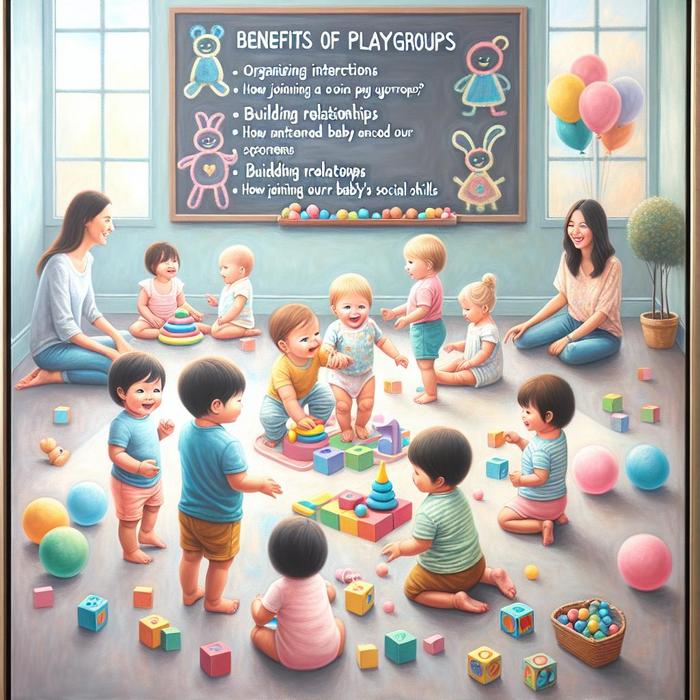The Power of Playgroups in Organizing Interactions
Children are naturally social beings. They interact with the people and environment around them, learning and developing skills essential for their growth. Among the numerous ways to foster these interactions, playgroups stand out as a remarkably beneficial approach.
Joining a playgroup provides an organized space where a child can interact with peers. This setting is ideal for facilitating productive connections and honing a baby’s social skills. Join Playgroup NYC is one notable platform that enhances children’s interactions through engaging, age-appropriate activities.
Unraveling the Benefits of Playgroups
Joining a playgroup unveils countless advantages that stretch beyond playing and having fun. These organized groups play a critical role in a child’s development. Let’s delve into some of these benefits:
- Social Development: In a playgroup, children learn to communicate, share, and cooperate with others. They understand the importance of taking turns, displaying empathy, and demonstrating patience.
- Building Relationships: Regular interaction with peers and adults in a playgroup helps children develop robust relationships. They learn to express their feelings and negotiate with others, enhancing their emotional intelligence.
- Preparation for School: Playgroups give children a taste of a structured environment, preparing them for a smooth transition to school. They become comfortable being away from their parents for short periods, promoting their independence.
- Parental Support: Parents also gain from playgroups, as they meet and engage with other parents. This interaction brings about shared experiences, advice, and emotional support, which can be especially helpful for first-time parents. For more tips on managing stress as a new parent, consider reading this blog post.
The Role of Playgroups in Social Development
How exactly do playgroups contribute to a child’s social development?
Firstly, they allow children to interact with others of the same age group. The children learn to understand different emotions, empathize with their friends, and help one another. They also start recognizing the concept of individuality and respect for others’ viewpoints.
Secondly, playgroups instill essential communication skills. When a child communicates needs or wants, expresses feelings, or shares ideas, the child is building critical language and communication skills.
Through play, children get opportunities to express their ideas and experiences, ask questions, solve problems, and explore different roles, according to an article published by American Academy of Pediatrics. Play, especially the one involving interaction with others, undoubtedly enhances children’s language and communication skills.
Building Relationships Through Playgroups
Another extraordinary benefit of playgroups is the opportunity they provide for building relationships. As children participate in group activities, they form bonds and friendships, promoting their sense of belonging and acceptance.
Playgroups also offer children the challenge of building relationships with adults other than their parents. In dealing with different adults, they learn to trust and respect people outside their family. These experiences are critical for their social and emotional development.
To further encourage your child’s speech development at home, you can engage them in interactive games and activities. Visit this link for some ideas that helped me considerably.
How to Enhance Your Child’s Playgroup Experience
While playgroups are naturally beneficial, parents can do a lot to maximize their child’s playgroup experience. Here are some tips:
- Ensure regular attendance: Consistency provides a sense of security and routine.
- Stay involved: Your involvement shows your child you value their activities, making them feel important and boosting their self-esteem.
- Encourage sharing: Playgroups are an excellent platform to teach your child about sharing and taking turns.
Creating a Perfect Environment for Playgroups
Creating a suitable environment for playgroups is crucial in ensuring that the children have the maximum benefits. Parents hold a significant key to making this possible through:
- Creating diverse activities: Playgroups should allow for various activities, ranging from structured play, creative activities, free play, outdoor play, story time, and singing to encourage a multi-faceted development.
- Setting up a familiar environment: A familiar and safe environment adds to the child’s comfort. An area stocked with age-appropriate toys and resources and an identified snack area can make a huge difference.
- Insisting on routine: Children benefit from routines. Routine offers structure and predictability and this can be enhanced even further by visual schedules.
- Maintaining inclusion: Playgroups should cater to all children. It should include children of various abilities and backgrounds to foster diversity and acceptance from a tender age.
Playgroups- Key to Early Childhood Intervention
For children with developmental delays or diagnosed with special needs, playgroups hold an even more important role. By being a part of playgroups early, they have a better chance of catching up with their peers through developmentally appropriate play.
For those looking for specialized playgroups for their children, platforms such as Sensory Social Playgroups and Kidspace Therapy offer structured encounters to enhance social skills and interaction with peers.
Adding Value To Lives of Families
The playgroups’ benefits aren’t restricted only to the children but also render support to the caregivers. Platforms like Community Health are focusing on this underserved aspect, enhancing the lives of families as a whole.
Playgroups are magical arenas where camaraderie among the little ones is fostered, and greater bonds among families are built. Their value in early social development and community support is immeasurable.
For those seeking assistance in grooming excellent social skills of their wards using the best practices of playgroups, can consider the professional team at Social Skills NJ.
The Future of Playgroups
Recognizing their pivotal role, efforts are underway to improvise the concept of playgroups further. This involves integrating technology and global awareness, enhancing disability inclusion, and focusing more on outdoor play.
The future is promising, and the playgroups in it are sure to scale unseen heights of evolutionary success. The playgroups of today are the leaders of tomorrow.
A Word of Advice
As we explore the benefits of playgroups, it’s essential to remember that every child is unique. While playgroups offer numerous advantages, they should complement your child’s individual needs, personality, and comfort levels.
